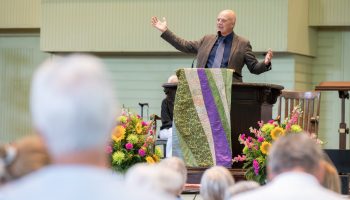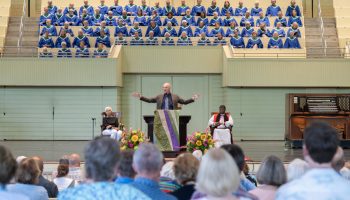
Column by Mary Lee Talbot
“Do you remember your first fear? Were you afraid of the dark, of getting lost in the grocery or grabbing a stranger’s hand? Your first day of school with a lot of strange kids, thunder shaking the house, hearing loved ones fighting, being forgotten at school after the other kids were picked up, or being alone?” asked the Rev. Frank M. Yamada.
He preached at the 9:15 a.m. morning worship service Wednesday in the Amphitheater. His sermon title was “Stilling the Waters of Our Soul — Relearning Trust,” and the scripture text was Psalm 23.
For Yamada, his first fear was lying awake in his bedroom wondering what would happen if his mother and father both died. What would happen to him? Instead of going to sleep, he would continue to circle downward to deep emptiness, feeling the lack of love and like he was being swallowed whole.
What would bring him out of this spiral? “Hearing my parents doing the laundry at night, hearing the metronomic click of the dryer would restore my calm. The sound of my parents’ presence assured me that they were still here,” he said. “We are not taught how to try to get back to peace.”
Yamada recalled the “still face experiment” by American psychologist Edward Tronik. According to Psychology Today (July 10, 2023), “The baby is in a seat facing her mother, and the mother is talking, smiling and making eye contact, and the infant responds by vocalizing, smiling back and pointing at things in the room. At one point, the mother turns away, and when she faces the baby, what the infant sees is a still, unsmiling face. The baby goes into overdrive to reengage her or his mother — doing all the things that previously have garnered attention — but no go; the mother’s face remains still. What you see on the video is heartbreaking: when the infant realizes that while Mommy is there, she is also somehow gone, the baby begins to melt down. She looks away, she waves her arms in protest, slumps in the seat and then begins to wail. It’s at that point that the mother relaxes her face and starts interacting with the infant again, re-establishing and repairing the connection. It’s worth noting that the baby is relatively wary and that it takes a bit of time for her to recover.”
Yamada continued, “What are the lessons for us? When the world changes, when there is uncertainty, when we are confronted with a still face or a stranger, how do we return to trust and peace? How do we return to God who has promised to never forsake us?”
He said, “What would a sermon series on the Psalms be without Psalm 23? It is like a Beach Boys concert without ‘God Only Knows,’ or a Nirvana concert without ‘Smells Like Teen Spirit.’ ”
Psalm 23 begins by talking in the third person about the shepherd; it is a confessional statement about God. “The Lord is my shepherd, I shall not want.” Verses 2 and 3 talk about the shepherd in the second person and why the shepherd can be trusted. “He makes me lie down in green pastures; / he leads me beside still waters; / he restores my soul. / He leads me in right paths / for his name’s sake.”
Yamada noted that the pastoral shepherd was a royal metaphor for a king who would rule justly and take care of the people. “We are now in the middle of the sermon series, in the middle of today’s sermon and in the middle of Psalm 23.”
He prefers the older translation of verse 4, “Yea, though I walk through the valley of the shadow of death, I will fear no evil.” The shepherd is with the sheep, protecting them from harm.
There are times when our fears inside, or change in the world outside, make us feel like we are descending into a desolate valley. He told the congregation, “We have to return to the inner timing that comes from God who is the shepherd. We need to return to what (theologian) Martin Buber called ‘I — Thou,’ to hesed. The good shepherd returns us to trust, peace, to smiles. The good shepherd restores us.”
The last verses talk about the table that is set. “It is not the image of the home holiday table, but full of unwanted guests. Maybe that is like your holiday table,” Yamada said. “But it is the Lord who puts us in the place of honor, who anoints and blesses us in front of all. Our cup overflows, and our gratitude gushes.”
Those who are seated at the table with us, he told the congregation, are those who mock what we hold dear. “God says this is my guest of honor, this feast is made for you, a banquet of honor for you. As we return to trust and peace, the still face is replaced by the face of the loving God.”
In verse 6, “Surely goodness and mercy shall follow me / all the days of my life,” should read “Surely goodness and mercy shall pursue me / all the days of my life,” Yamada said. “Like the Father running to meet the prodigal, like a mother reaching for one last hug, God runs after us and will pursue us so that we will dwell in the house of the Lord.”
He continued, “In times when you are surrounded by hostile forces, remember the voice of the Good Shepherd. God says, ‘I will find you places of peace, and I will never leave you or forsake you.’ And for that we give great thanks.”
The Rev. Rachel Erin Stuart, senior pastor of the Hurlbut Memorial Community United Methodist Church, presided. Melissa Spas, vice president for religion at Chautauqua Institution, read the scripture. Laura Smith, organ scholar, performed the prelude “Bryn Calfaria,” by Ralph Vaughan Williams, on the Massey Memorial Organ. The Motet Choir sang “The Lord is my Shepherd,” music by Howard Goodall, text from Psalm 23. The choir was under the direction of Joshua Stafford, director of sacred music and the Jared Jacobsen Chair for the Organist, and accompanied by Owen Reyda, organ scholar, on the Massey organ. Stafford performed “Pastorale,” by Charles Villiers Stanford, for the postlude. Support for this week’s services and chaplaincy are provided by the Jackson-Carnahan Memorial Chaplaincy, the J. Everett Hall Memorial Chaplaincy and the Randell-Hall Memorial Chaplaincy.




